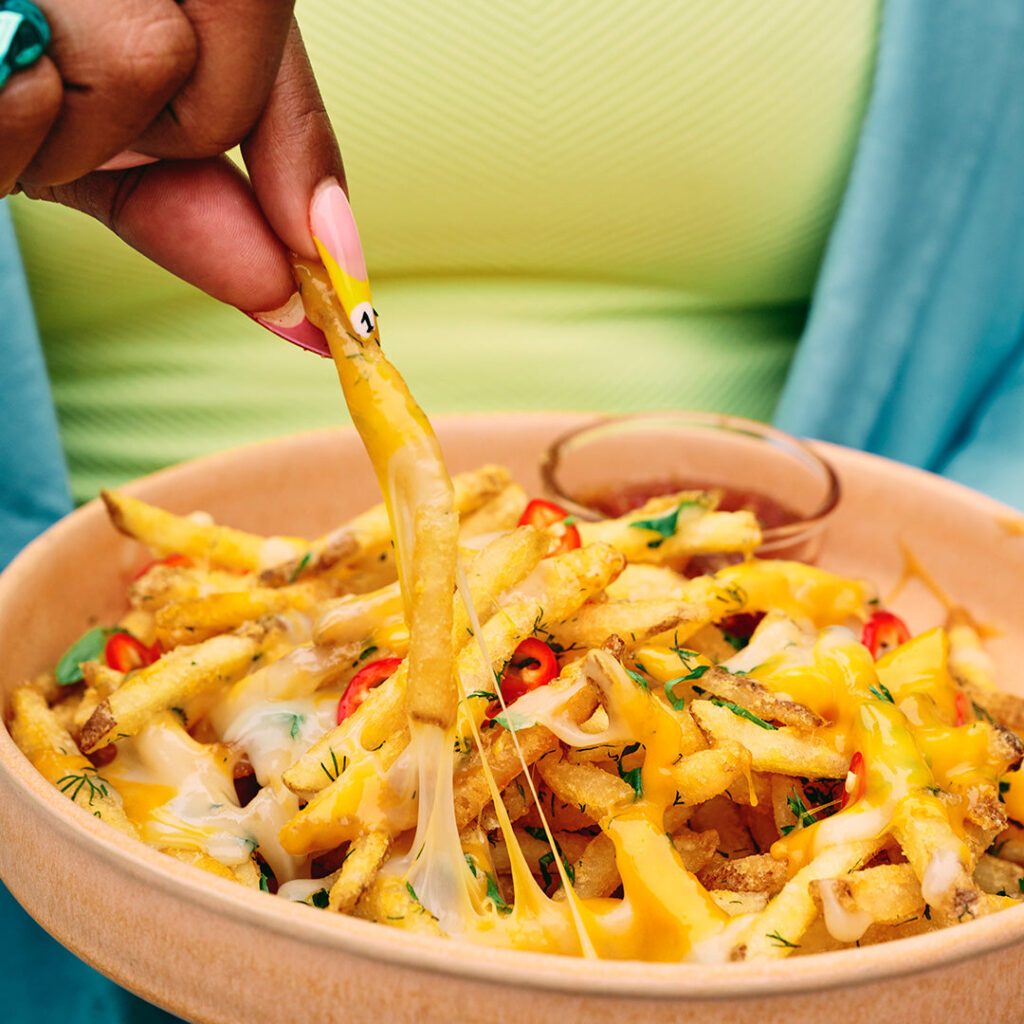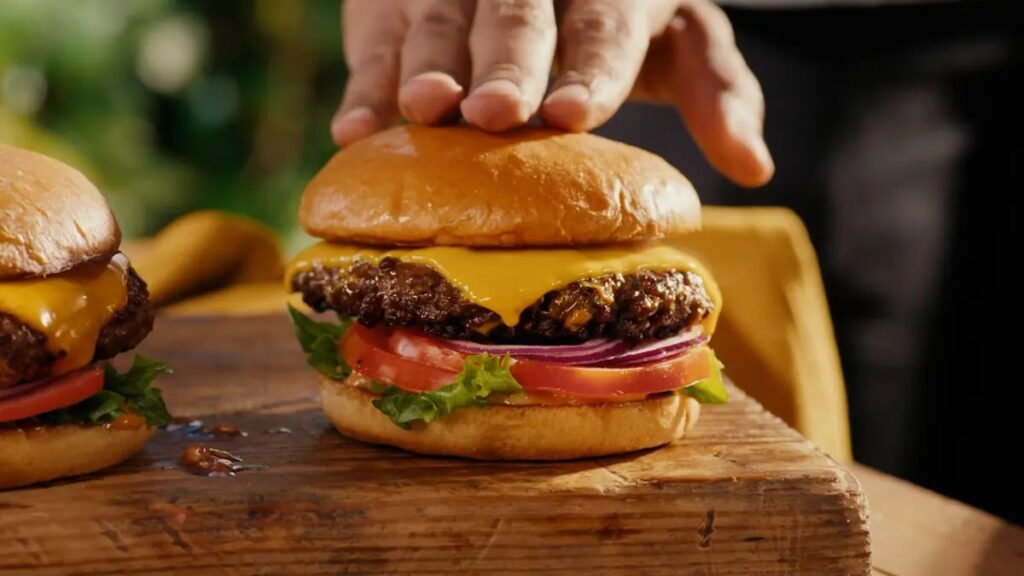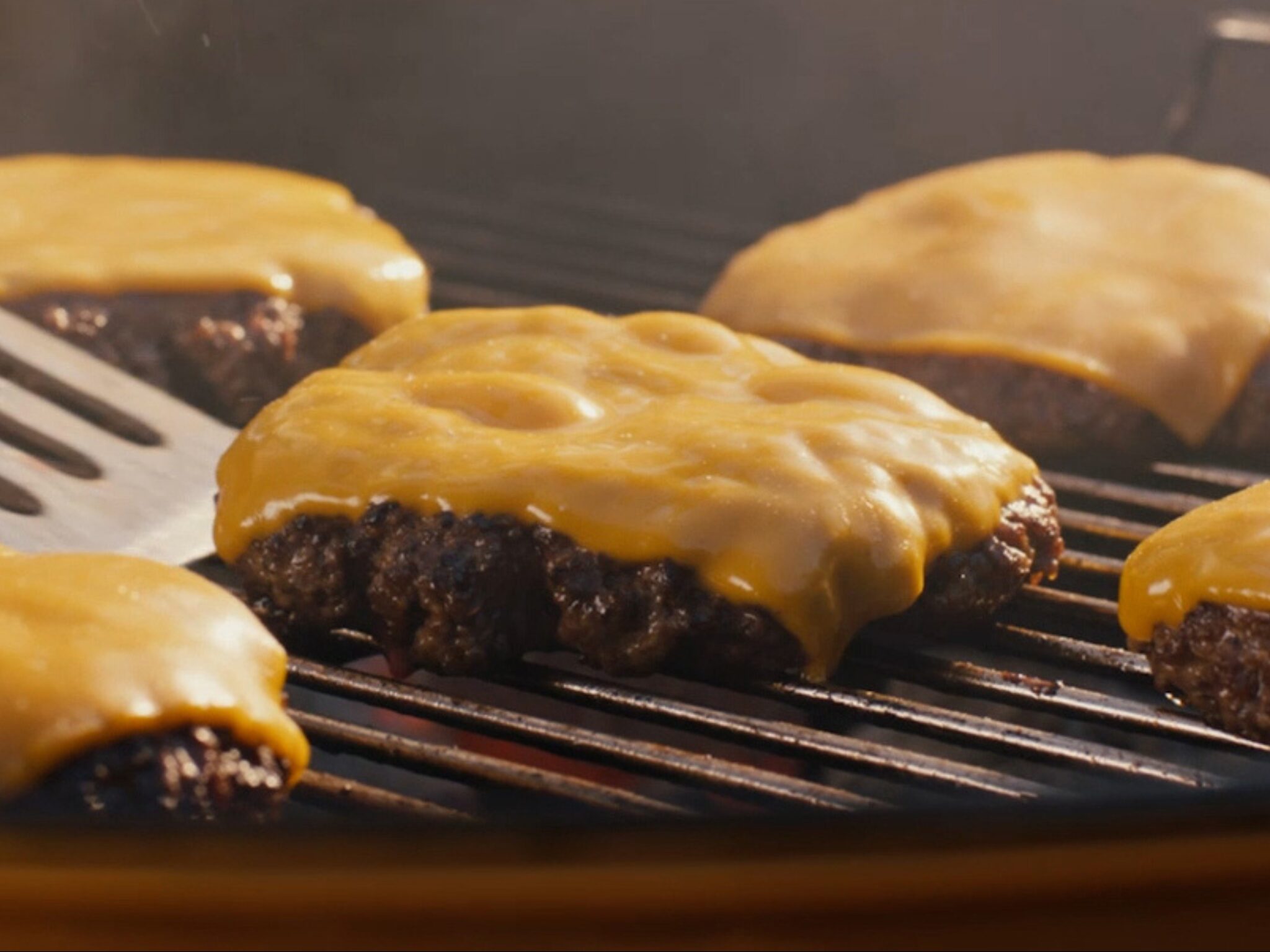Conventional Beef, Vegan Cheese: Can Daiya Lure In the Flexitarians with New Ad Campaign?
6 Mins Read
Continuing its flexitarian-targeting marketing drive, Canadian vegan cheesemaker Daiya might be ruffling a few feathers with its latest campaign, which features a cheeseburger with conventional beef and plant-based cheese.
“Enough controversy – let’s eat.”
That’s the message portrayed by a new ad by Daiya, the vegan cheese giant that recently overhauled its recipes and packaging to introduce a better-tasting product that would appeal to flexitarians, with a tagline reading: “100% plant-based. Even if you’re not.”
The company is doubling down on that shift away from an “all or nothing” approach to eating vegan. With the ‘Not So Controversial’ campaign, it is accepting that the idea of combining a beef burger with plant-based cheese might be blasphemous to both meat-eaters and vegans, but that’s exactly the point.
If manufacturers and consumers can take to blended meat – a combination of animal-derived meat with plant-based ingredients – what’s stopping them from mixing beef with vegan cheese? The no-judgement sentiment aims to counter what Daiya says is the “bougie sentiment” and “elitist attitude” of the plant-based industry, and appeal to the mainstream.
“Our aim is not to convert, but to invite everyone to discover and enjoy the benefits of plant-based eating, showing how our products can add delicious variety to their meals, enhancing the culinary experience for all, regardless of dietary choices,” Daiya chief marketing officer John Kelly told Adweek.
Appealing to flexitarians in a heavy cheese-eating country

The ad campaign celebrates Daiya’s reformulated cheese, which was the result of a months-long, multi-million-dollar project that replaced chickpea protein with a fermented oat cream base. This also meant a new direction for packaging and branding for the company, which described the new cheeses as “creamier” than their predecessors, and “tastier, meltier, and stretchier than any other on the market”.
The 30-second spot is centred on a backyard barbecue with burgers sizzling on the grill, topped with its vegan cheese slices that melt as they cook. Daiya says its goal is to be inclusive and appeal to American flexitarians, a cohort that is growing in numbers. While one survey revealed that a US-wide survey by the International Food Information Council revealed that only 6% of Americans followed a flexitarian diet in 2022, Numerator data suggests that 72 million US households contain flexitarians – that’s over half of the total.
Meanwhile, US cheese consumption hit an all-time high in 2022, but vegan cheese lags behind. The latter represents just 1.1% of the country’s cheese sector in retail sales, with only 5% of households buying plant-based cheese (compared to 96% for conventional cheese). That’s essentially where Daiya’s argument lies: its target consumer is the American who eats animal products, and it’s banking on the pedigree of its products to change their mind and boost the vegan cheese category.
“We should’ve had this conversation two years ago, and we’ve had our heads down a little bit,” said Jonathan Schoenberg, executive creative director and partner at TDA Boulder, the ad agency that worked with Daiya. “It’s a safe bet to talk to the loyalists, so let’s start talking to that larger audience. If we don’t, we’re fringe companies.”
On average, Americans eat about three hamburgers a week – Daiya’s use of burgers as a pricing staple in a familiar barbecuing backdrop could therefore go a long way in reshaping consumer opinions about vegan cheese. “This appeal to tradition is used to dissuade consumers from seeing the product as an ‘alternative’,” Vegan Women Summit founder Jennifer Stojkovic told Adweek.
She added that the “melt and stretch” of Daiya’s cheese in the video will likely be the USP, breaking away from the mould of ‘rubbery’ vegan cheeses of the past. A study leveraging Kroger data from 60 million American households revealed that nearly three-quarters (73%) of Americans are unhappy with the flavour (which they describe as “plastic” or “unnatural”) and texture (“grainy”) of vegan cheese. They want cheeses that taste better, melt well and have a creamy texture.
Daiya’s new oat cream cheeses boast these very characteristics, with the brand claiming fermentation helps its products reach “dairy parity”, especially in terms of meltability. “We expect this advancement to not only rejuvenate consumer confidence in the category, but revitalise the category’s market potential, finally offering retailers a product that truly bridges the gap between consumer expectations and dairy-free offerings,” its chief commercial officer Melanie Domer had said during the launch.
Response to Daiya ad seems mixed – but meat reduction remains crucial

“Many brands make the mistake of overwhelming consumers with information that is irrelevant to a food purchasing decision – Daiya has done the exact opposite,” added Stojkovic. “We taste with our eyes, and they surely know it.”
Having said that, there’s an argument to be made that commercials like Daiya’s could inadvertently encourage even greater meat consumption, which is the opposite of what scientists have been calling for. Americans consume six times more red meat than the amount outlined by the Eat-Lancet Commission‘s planetary health diet recommendations. In fact, just 12% of Americans are responsible for half of the country’s meat consumption.
But 74% of these consumers don’t believe eating meat is linked to climate change, and that rises to 78% for dairy. This is despite one study revealing that the country needs to cut its meat intake by 82% if it wants to avoid further climate disasters. Daiya’s mix-and-match approach has market potential, but equally, the potential impact of eating more beef – which has the worst emissions of any food – on the climate cannot be understated.
The vegan cheese company has said it is ready to face backlash from vegetarian or vegan customers. And it seems like it already is. “As a vegan, I’ll have some faux meats, but cheese kind of sucks. Someone who eats meat likely has an even lower amount of patience for analogs, this is not going to net them sales,” one Reddit user wrote.
Another added: “Putting veggie cheese on [an] animal flesh product? I am confused. Why would that appeal in any way to a meat eater?”
But – to Daiya’s point – many agreed with the campaign’s potential efficacy. “As long as they literally aren’t selling a product made with meat, I recognize they need to appeal to those who just don’t eat dairy,” said one Reddit user. “Honestly, I get it. Lots of [omnivores] are willing to drop meat, but won’t drop cheese. Maybe starting with showing how good the [plant-based] dairy can be people will give up the meat too,” wrote another.
Daiya would argue that if this could help Americans eat less dairy – and subsequently less meat – it’s a win for the planet and the plant-based sector. This is also crucial in an election year where climate is high on the agenda, and fears persist that a reelection of Donald Trump (who is edging Joe Biden in the polls at the time of writing) could spell disaster for environmental policy. The importance becomes even more apparent when you realise that 15% of Americans don’t believe climate change is real.
“The more people eating this food, the better—better for the environment, better for human health, better for animal welfare,” said Schoenberg. “We’re thinking about how we can have a long-term impact. These companies matter, and we need to make them relevant to more buyers.”



